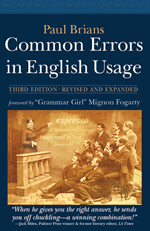The saying attributed to Winston Churchill rejecting the rule against ending a sentence with a preposition must be among the most frequently mutated witticisms ever. I have received many notes from correspondents claiming to know what the “original saying” was, but none of them cites an authoritative source.
The alt.english.usage FAQ states that the story originated with an anecdote in Sir Ernest Gowers’ Plain Words (1948). Supposedly an editor had clumsily rearranged one of Churchill’s sentences to avoid ending it in a preposition, and the Prime Minister, very proud of his style, scribbled this note in reply: “This is the sort of English up with which I will not put.” The American Heritage Book of English Usage agrees.
The FAQ goes on to say that the Oxford Companion to the English Language (no edition cited) states that the original was “This is the sort of bloody nonsense up with which I will not put.” To me this sounds more likely, and eagerness to avoid the offensive word “bloody” would help to explain the proliferation of variations.
A quick search of the Internet turned up an astonishing number. In this era of copy-and-paste it’s truly unusual to find such rich variety. The narrative context varies too: sometimes the person rebuked by Churchill is a correspondent, a speech editor, a bureaucrat, or an audience member at a speech and sometimes it is a man, sometimes a woman, and sometimes even a young student. Sometimes Churchill writes a note, sometimes he scribbles the note on the corrected manuscript, and often he is said to have spoken the rebuke aloud. The text concerned was variously a book manuscript, a speech, an article, or a government document.
Here is just a sample of the variations circulating on the Net:
- That is a rule up with which I will not put.
- This is the kind of arrant pedantry up with which I will not put.
- This is the type of arrant pedantry up with which I will not put.
- Not ending a sentence with a preposition is a bit of arrant pedantry up with which I will not put.
- That is the sort of nonsense up with which I will not put
- This is insubordination, up with which I will not put!
- This is the sort of nonsense up with which I will not put.
- This is the sort of thing up with which I will not put.
- Madame, that is a rule up with which I shall not put.
One poor soul, unfamiliar with the word “arrant,” came up with: “That is the sort of errant criticism up with which I will not put.”
Then there are those who get it so scrambled it comes out backward:
- Ending a sentence with a preposition is something up with which I will not put.
- Ending a sentence with a preposition is something up with which we will not put.
- From now on, ending a sentence with a preposition is something up with which I will not put.
- Please understand that ending a sentence with a preposition is something up with which I shall not put.
I checked the indexes of a dozen Churchill biographies, but none of them had an entry for “prepositions.”
Ben Zimmer has presented evidence on the alt.usage.english list that this story was not originally attributed to Churchill at all, but to an anonymous official in an article in The Strand magazine. Since Churchill often contributed to The Strand, Zimmer argues, it would certainly have identified him if he had been the official in question. It is not clear how the anecdote came to be attributed to Churchill by Gowers, but it seems to have circulated independently earlier.
Back to list of errors.
BUY THE BOOK!
